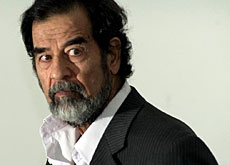“It’s all about justifying the US invasion”

As the trial of Saddam Hussein got underway in Iraq, a legal expert from Geneva University explains why he declined to defend the ousted dictator.
Marc Henzelin says the special tribunal is not compatible with international law and is little more than a soap opera.
Saddam and seven other defendants are accused of crimes against humanity in the killing of more than 140 Shi’ite Muslim villagers at Dujail in 1982.
The toppled Iraqi ruler has been in detention since he was captured by United States forces in Iraq in December 2003.
Court proceedings have begun at a former presidential palace complex in Baghdad.
But speculation is rife that that the trial could be adjourned after a day or two of procedural argument.
The interview with Marc Henzelin, who teaches at the centre for international law at Geneva University, was first published in the Swiss SonntagsZeitung newspaper.
SonntagsZeitung: Mrs Hussein asked you to defend her husband in court. Why did you decline the mandate?
Marc Henzelin: I asked for assurances that his defence is a legal not a political matter. I also wanted guarantees that I could talk to other lawyers to coordinate the defence. Thirdly, I would not like to see the trial turn into a circus show.
I visited Baghdad 12 times over the past two years. Investigating magistrates were killed, as well as witnesses and evidence was destroyed during the war.
Under such circumstances a trial risks becoming nothing more than a show. These are the reasons why I said no.
S.Z.: The trial of Saddam has been likened to the Nuremberg tribunals at the end of the Second World War.
M.H.: The two tribunals can only be compared in part. In both cases it is the victors holding court over the losers.
But the difference is that the trials of Nuremberg had a historic goal. They wanted to get as close as possible to the truth about the Nazi crimes.
S.Z.: What about the trial of Saddam Hussein?
M.H.: It is the exact opposite. The trial focuses on a small part of the criminal record of the Iraqi regime, and the Iraqi population feels highly emotional about it.
But it is not possible to perceive the dimensions of the Iraqi rule of terror in the trial.
I think it is all about justifying the United States’ invasion of Iraq and to string Saddam Hussein up sooner rather than later without asking too many questions.
S.Z.: The trial is to be broadcast live on television to ensure that the proceedings are fair and transparent.
M.H.: I have 20 years of experience as a criminal defence lawyer. I can assure you that 90 per cent of what is actually going on will not be decided in the courtroom, but during the investigation.
I ask you: What’s the point of a trial if the defence has not been able to take part in the investigations? Or if it is not possible to call witnesses to the stand because they were executed or have to fear for their lives?
The trial of Saddam might provide wonderful material for a US television series with a lawyer and a prosecutor crossing swords. But this has got nothing to do with a fair trial.
S.Z.: Why not?
M.H.: Because it is not a regular court deliberating the case. Special tribunals are completely against international law.
S.Z.: In what way?
M.H.: In light of the Geneva and the Hague Conventions [on international law for humanitarian concern and the protection of cultural property in armed conflicts] this court is clearly illegal. Occupying powers have no right to change the legal system of a country. This is precisely what the US has done.
What’s more, the judges were not elected but appointed by the occupying powers. They flew in a nephew of Mr Chalabi [Salem Chalabi’s uncle Ahmed led the foremost Iraqi opposition movement, the US-backed Iraqi National Congress]. He was a lawyer in London specialising in commercial law. Later he was appointed president of the Iraqi special tribunal.
At the Nuremberg trial the four victorious powers at least assigned their best judges to the task.
Translated from an interview by François Tanda, SonntagsZeitung
The toppled Iraqi leader Saddam Hussein is charged with ordering the deaths of 143 Shi’ite Muslim men following a 1982 assassination attempt against him.
He might also be tried for genocide and war crimes for the killing of Kurds in the 1980s, as well as the suppression of uprisings by Shi’ites and Kurds in 1991.
The organisation Human Rights Watch said 200,000 potential opponents were killed during Saddam’s regime between 1979 and 2003.

In compliance with the JTI standards
More: SWI swissinfo.ch certified by the Journalism Trust Initiative












You can find an overview of ongoing debates with our journalists here . Please join us!
If you want to start a conversation about a topic raised in this article or want to report factual errors, email us at english@swissinfo.ch.